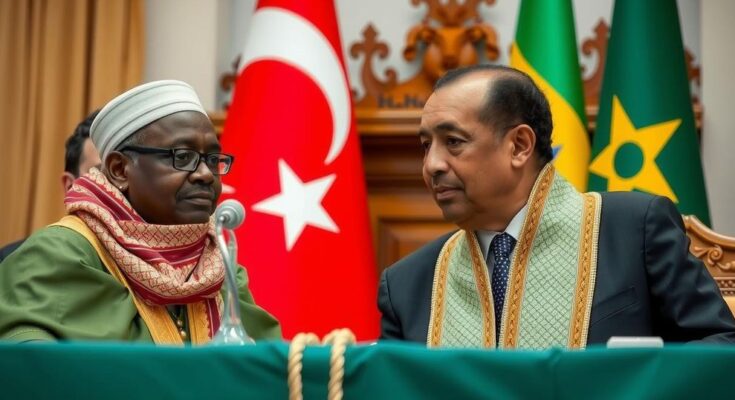Turkey is set to mediate talks between Somalia and Ethiopia this week to resolve ongoing disputes over port access and sovereignty issues due to Ethiopia’s naval agreement with Somaliland. The meeting is expected to include direct discussions between President Mohamud and Prime Minister Ahmed, amidst growing tensions and a complex political landscape in the region.
Turkey is preparing to host discussions this week involving Somali President Hassan Sheikh Mohamud and Ethiopian Prime Minister Abiy Ahmed. This summit aims to address a protracted dispute regarding Ethiopia’s quest for port access in the Horn of Africa. Reports indicate that President Mohamud will engage in direct dialogue with Prime Minister Ahmed, although both the Turkish Foreign Ministry and the Ethiopian Embassy in Ankara have refrained from providing comments on the matter.
Tensions have escalated recently due to Addis Ababa signing a naval agreement with the self-declared state of Somaliland, which Somalia perceives as a threat to its sovereignty. In retaliation to this perceived affront, Turkey, which has strengthened its security and political ties with Somalia, established its own naval agreement with Mogadishu, encompassing provisions for a Somali navy and the safeguarding of its territorial waters. Furthermore, this agreement has initiated an energy collaboration that saw Turkish drilling vessels arrive along the Somali coastline.
Relations between Ethiopia and Somalia remain tense, with Somali officials warning of possible military conflict should the naval deal with Somaliland continue. Turkey previously facilitated two rounds of discussions at the foreign ministerial level earlier in the year, with officials hinting at positive movement in negotiations. Observers suggest that the upcoming meeting between President Mohamud and Prime Minister Ahmed could yield favorable outcomes, potentially enabling Somalia to offer Ethiopia access to a port in exchange for the cancellation of the agreement with Somaliland.
The political landscape is further complicated following recent presidential elections in Somaliland, which introduced a new leader less inclined to support Prime Minister Ahmed. Analysts in Ankara foresee that if progress is made during these talks, Turkish President Recep Tayyip Erdogan may play an instrumental role in successfully concluding the discussions.
The ongoing conflict between Somalia and Ethiopia primarily revolves around maritime access and sovereignty issues, exacerbated by Ethiopia’s naval agreement with Somaliland. Somaliland’s declaration of independence is not recognized internationally, and Somalia views any agreements involving Somaliland as direct threats to its territorial integrity. In response to these developments, Turkey has established a strong diplomatic relationship with Somalia and signed its naval agreement to enhance security and support for the Somali government.
In summary, Turkey’s role in hosting talks between Somali and Ethiopian leaders reflects its growing influence in the Horn of Africa as a mediator in regional disputes. The tensions stemming from Ethiopia’s arrangements with Somaliland pose a significant challenge to Somali sovereignty, and Turkey’s commitment to support Somalia through strategic agreements highlights its intent to stabilize the region. Observers remain cautiously optimistic about the potential for a resolution following this week’s discussions.
Original Source: www.middleeasteye.net




